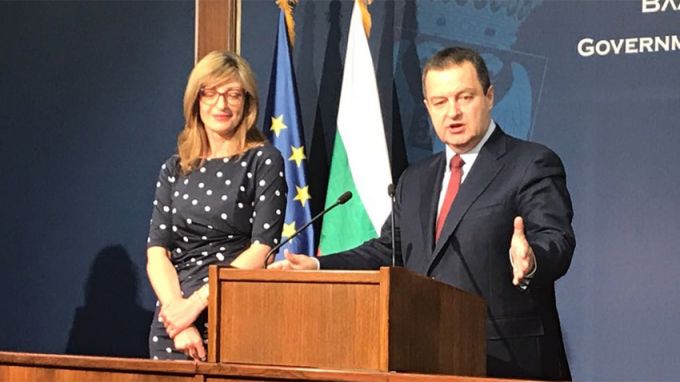
The Balkan tour of Bulgarian Foreign Minister Ekaterina Zaharieva which started in the second half of July is now about to end. After her visits to Serbia, Bosnia and Herzegovina, Albania and Macedonia, Mrs. Zaharieva is expected to have talks in Montenegro as well through the forthcoming days or weeks. The major goal of the tour is to present to the Western Balkan countries the priorities of the Bulgarian presidency of the Council of the EU, which is about to begin in a bit more than 4 months.
During the Belgrade-held talks Foreign Minister of Serbia Ivica Dačić voiced to Mrs. Zaharieva the expectation for the acceleration of his country’s negotiation closure with the EU. The Bulgarian foreign minister in her turn offered assistance in the negotiation process and invited President Alexandar Vucic to attend the Gymnich informal meeting of EU foreign affairs ministers during the Bulgarian presidency.
Albanian Foreign Minister Ditmir Bushati expressed his hope that being a friendly state, Bulgaria would cooperate for the EU integration of Albania while staying ahead of the EU. In her turn Minister Zaharieva said she expected at least the political decision for the start of negotiations with Albania to be taken by the end of the Bulgarian presidency.
Macedonia has similar expectations for support. In early August Bulgaria signed with it the long-expected, both regionally and internationally, Good-Neighbor Treaty. The signing of the document was a prerequisite for Sofia to support the EU perspective of Macedonia. Hailing it, Minister Zaharieva said she hoped the negotiation process with the EU would start at last for Macedonia in 2018.
At the end of last week and during the Sarajevo-held talks with Minister Zaharieva Foreign Minister of Bosnia and Herzegovina Igor Crnadak expressed his wish for the receiving of a candidate status by his country during the Bulgarian EU presidency. However, Minister Zaharieva pointed out that this thing would be possible only in case the EC saw clear political will for the carrying out of the reforms necessary.
The visit of the Bulgarian foreign minister to Montenegro hasn’t taken place yet, but even prior to it Minister of European Affairs Aleksandar Pejović commented that his country expected a lot from the forthcoming Bulgarian presidency of the Council of the EU, hoping that within its frames ‘a sort of a calendar for the EU expansion in the Balkans’ would be framed.
Alongside other things, the Balkan tour of Minister Zaharieva shows that the Bulgarian presidency faces serious challenges due to the significant differences between the Western Balkan states and the current attitude of the EU, regarding its expansion in that direction. For instance Serbia has been negotiating its accession since 2015 and expects the end of the process in 2019, while Bosnia and Herzegovina hasn’t even received its applicant status. The EC supports the European perspective of the Western Balkans, but requires big and major changes in the region prior to its expansion. Still, Sofia meets higher expectations, as Bulgaria is the first Balkan state to chair the EU - after Greece. The implementation of the Balkan priority of the Bulgarian presidency of the Council of the EU will face challenges for sure.
English version: Zhivko Stanchev
Greek and Turkish Cypriots call for more crossing points along the Green Line The political parties of the Greek Cypriots and the Turkish Cypriots have called on their leaders to open more crossing points along the..
Lawmakers gathered on Wednesday to make yet another, ninth, attempt to elect a Speaker of the 51st National Assembly , which would have allowed Parliament to begin its work. Four candidates were put to a first vote - Atanas Atanasov of We Continue the..
The draft budget for 2025 will be submitted by the caretaker government to the National Assembly at the end of next week , Finance Minister Lyudmila Petkova said. The draft includes a planned deficit of 3%, or BGN6 billion (about EUR3 billion)...

+359 2 9336 661
